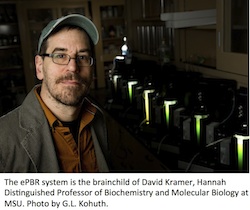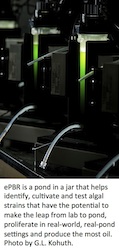 A team of Michigan State University (MSU) scientists have invented a new technology that they believe increases the odds of helping algae-based biofuels bridge the gap to success. The environmental photobioreactor or ePBR system is the first standard algae growing platform and it stimulates dynamic natural environments. The system is featured in the current issue of Algal Research.
A team of Michigan State University (MSU) scientists have invented a new technology that they believe increases the odds of helping algae-based biofuels bridge the gap to success. The environmental photobioreactor or ePBR system is the first standard algae growing platform and it stimulates dynamic natural environments. The system is featured in the current issue of Algal Research.
To better visualize the technology, ePBR is in essence a pond in a jar that helps identify, cultivate and test algal strains that have the potential to make the leap from lab to pond – or thrive and multiple in real-world, real-pond settings and produce vast amounts of oil.
As the quest for “better biofuels” continues, many researchers are looking to algae as a viable solution, but a barrier to commercial success has been that algal strains that perform well in labs don’t often perform well when moved to commercial scale applications.
“It’s like training elementary kids to be really good pingpong players,” explains Ben Lucker, MSU research associate.. “But then they take the kids and throw them into a football game against professional players; in those settings, they simply can’t compete at all.”
 The ePBRs, which the team believes will help make algae biofuel research more desirable to investors, were the brainchild of David Kramer, Hannah Distinguished Professor of Biochemistry and Molecular Biology at MSU. His lab is unique. Although it’s housed among other plant biologists, it could be mistaken for an electronics factory. The benches are covered with wires, soldering irons and printed circuit boards. There are even few early prototypes that provide a history of ePBR’s progress.
The ePBRs, which the team believes will help make algae biofuel research more desirable to investors, were the brainchild of David Kramer, Hannah Distinguished Professor of Biochemistry and Molecular Biology at MSU. His lab is unique. Although it’s housed among other plant biologists, it could be mistaken for an electronics factory. The benches are covered with wires, soldering irons and printed circuit boards. There are even few early prototypes that provide a history of ePBR’s progress.
The latest models glow green and whir quietly as they test various strains. By allowing scientists to duplicate natural settings in a lab, ePBRs eliminate many variables before scaling up. The bioreactors are about the size of coffee makers and can induce changes in light, temperature, carbon dioxide, oxygen, evaporation, nutrient availability and more.
The ePBR system also can duplicate and confirm results from experiments conducted anywhere in the world. It replaces home-built growing platforms made from flasks, tubing, aluminum foil and grow lights and gives researchers a tool that can consistently replicate conditions and reproduce results, Lucker said.
The potential of ePBRs has already inspired the launch of a company, Phenometrics, an MSU spinoff headquartered in Lansing, Michigan, and while only two years old, steady orders for the bioreactors have the company on the same track of success as algal biofuels.

